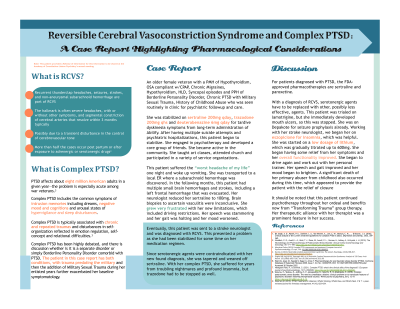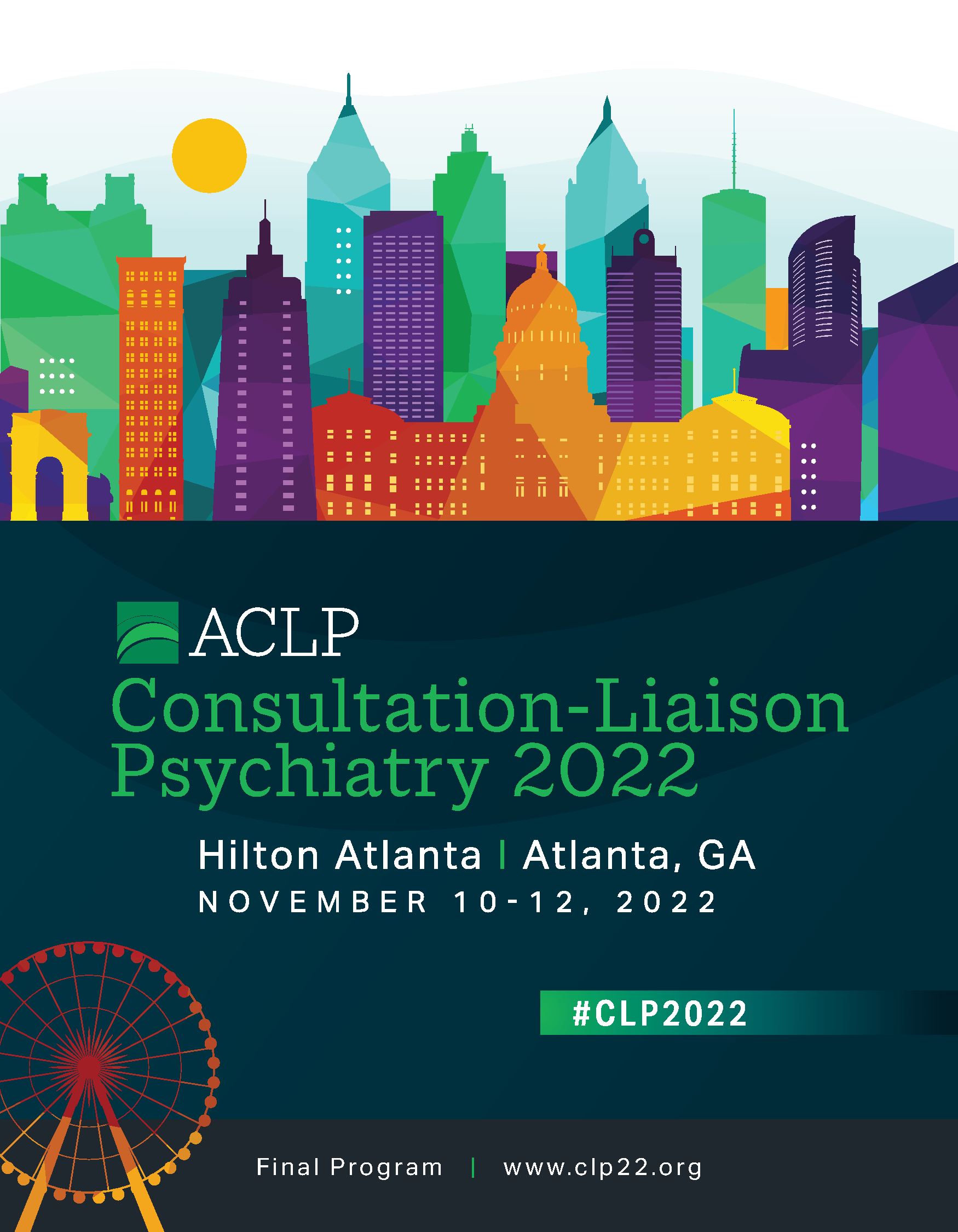Back

Neurocognitive Disorders, Delirium and Neuropsychiatry
Poster Session
(089) Managing Reversible Cerebral Vasoconstriction Syndrome in a US Military Veteran with Complex PTSD and Borderline Personality Disorder

Abstract:
Background: Reversible Cerebral Vasoconstriction Syndrome is a rare condition, frequently presenting with an initial "thunderclap" headache. It is often fully reversible, however, it can also be accompanied by brain bleeds and/or stroke. This syndrome is thought to be due to a transient disturbance in the control of cerebral vascular tone with sympathetic overactivity. SSRIs have been implicated as contributory agents to this condition.
Objectives: Patients who have been stabilized on SSRIs often struggle with management of their symptomatology after this diagnosis and subsequent medication changes. This is a case report of a 63 year old female veteran who suffered from a complicated childhood trauma history and was later diagnosed with both Borderline Personality Disorder and PTSD. Her medical history was significant for chronic daily headaches, marked insomnia with frequent nightmares, COPD and hypothyroidism. In 2020, this patient suffered from a non-traumatic subarachnoid hemorrhage, followed by three other brain bleeds in the left parietal parenchyma and the left frontal areas. After she was diagnosed with RCVS, all serotonergic medications were weaned off and discontinued. While this patient had suffered multiple adverse life events previous to this, she had been stabilized for many years on sertraline and trazodone and had successfully avoided psychiatric hospitalizations.
Methods: This is a case report from an established compliant clinic patient and it incorporates a literature review from PubMed on selective serotonin re-uptake inhibitors and reversible cerebral vasoconstrictive syndrome.
Results: After being weaned off sertraline and trazodone, this patient did not suffer any other brain bleeds. She did have a series of seizures, likely secondary to the effects of previous arterial clipping procedures. She struggled with intense emotional lability after sertraline and trazodone were discontinued. Different medications were trialled and frequent psychotherapy played an even more prominent role in her well-being.
Conclusions: Since serotonin's effects on the brain include vasoconstriction, eliminating SSRIs after the diagnosis of RCVS is important for treatment and prevention. Tailoring non-serotonergic agents to target the patient's most problematic symptoms is essential and augmentation with supportive psychotherapy and other focused modalities remains a significant component of ongoing care.
Keywords: RCVS, SSRIs, reversible cerebral vasoconstriction syndrome, headache, PTSD
References:
Manning T, Bartow C, Dunlap M, Kiehl R, Kneale H, Walker A. Reversible Cerebral Vasoconstriction Syndrome Associated With Fluoxetine. J Acad Consult Liaison Psychiatry. 2021 Nov-Dec;62(6):634-644. doi: 10.1016/j.jaclp.2021.07.013. Epub 2021 Aug 8. PMID: 34371244.
Song TJ, Lee KH, Li H, Kim JY, Chang K, Kim SH, Han KH, Kim BY, Kronbichler A, Ducros A, Koyanagi A, Jacob L, Kim MS, Yon DK, Lee SW, Yang JM, Hong SH, Ghayda RA, Kang JW, Shin JI, Smith L. Reversible cerebral vasoconstriction syndrome: a comprehensive systematic review. Eur Rev Med Pharmacol Sci. 2021 May;25(9):3519-3529. doi: 10.26355/eurrev_202105_25834. PMID: 34002826.
Background: Reversible Cerebral Vasoconstriction Syndrome is a rare condition, frequently presenting with an initial "thunderclap" headache. It is often fully reversible, however, it can also be accompanied by brain bleeds and/or stroke. This syndrome is thought to be due to a transient disturbance in the control of cerebral vascular tone with sympathetic overactivity. SSRIs have been implicated as contributory agents to this condition.
Objectives: Patients who have been stabilized on SSRIs often struggle with management of their symptomatology after this diagnosis and subsequent medication changes. This is a case report of a 63 year old female veteran who suffered from a complicated childhood trauma history and was later diagnosed with both Borderline Personality Disorder and PTSD. Her medical history was significant for chronic daily headaches, marked insomnia with frequent nightmares, COPD and hypothyroidism. In 2020, this patient suffered from a non-traumatic subarachnoid hemorrhage, followed by three other brain bleeds in the left parietal parenchyma and the left frontal areas. After she was diagnosed with RCVS, all serotonergic medications were weaned off and discontinued. While this patient had suffered multiple adverse life events previous to this, she had been stabilized for many years on sertraline and trazodone and had successfully avoided psychiatric hospitalizations.
Methods: This is a case report from an established compliant clinic patient and it incorporates a literature review from PubMed on selective serotonin re-uptake inhibitors and reversible cerebral vasoconstrictive syndrome.
Results: After being weaned off sertraline and trazodone, this patient did not suffer any other brain bleeds. She did have a series of seizures, likely secondary to the effects of previous arterial clipping procedures. She struggled with intense emotional lability after sertraline and trazodone were discontinued. Different medications were trialled and frequent psychotherapy played an even more prominent role in her well-being.
Conclusions: Since serotonin's effects on the brain include vasoconstriction, eliminating SSRIs after the diagnosis of RCVS is important for treatment and prevention. Tailoring non-serotonergic agents to target the patient's most problematic symptoms is essential and augmentation with supportive psychotherapy and other focused modalities remains a significant component of ongoing care.
Keywords: RCVS, SSRIs, reversible cerebral vasoconstriction syndrome, headache, PTSD
References:
Manning T, Bartow C, Dunlap M, Kiehl R, Kneale H, Walker A. Reversible Cerebral Vasoconstriction Syndrome Associated With Fluoxetine. J Acad Consult Liaison Psychiatry. 2021 Nov-Dec;62(6):634-644. doi: 10.1016/j.jaclp.2021.07.013. Epub 2021 Aug 8. PMID: 34371244.
Song TJ, Lee KH, Li H, Kim JY, Chang K, Kim SH, Han KH, Kim BY, Kronbichler A, Ducros A, Koyanagi A, Jacob L, Kim MS, Yon DK, Lee SW, Yang JM, Hong SH, Ghayda RA, Kang JW, Shin JI, Smith L. Reversible cerebral vasoconstriction syndrome: a comprehensive systematic review. Eur Rev Med Pharmacol Sci. 2021 May;25(9):3519-3529. doi: 10.26355/eurrev_202105_25834. PMID: 34002826.

Lynne D. Boone, DO
Consultation-Liaison Psychiatrist
Harry S Truman Veterans Administration Hospital
Columbia, MO, United States

